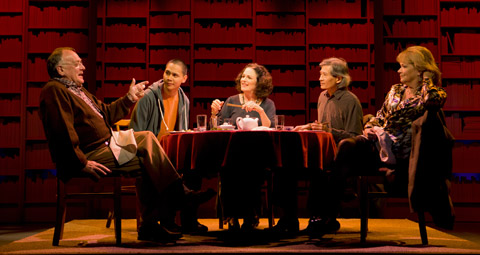
MORTALS COILED The actors in Rosanna Yamagiwa Alfaro’s new play perform a dance of death and ethnic tension. |
Fear of mortality is a domino in Before I Leave You, the play with which 72-year-old dramatist Rosanna Yamagiwa Alfaro, who has been flexing her inky fingers in Cambridge for 40 years, enters the big time. The writer has been produced by, among others, New York's Pan Asian Rep and the now-defunct Peoples' Theater in Inman Square. But having been anointed a Huntington Theatre Company Playwriting Fellow last November, she is now receiving a thoroughly professional world premiere courtesy of the troupe (at the Calderwood Pavilion through November 13). The play, which centers on a quartet of aging Cantabrigians in the wake of a health crisis, is wry and rueful by turns in its consideration of aging (and, secondarily, ethnicity). But I just didn't believe its central relationship dynamics.Koji, a Japanese American college professor and theater director, has been married to Jewish American Emily, a painter, for 40 years; the two have a 22-year-old son, Peter, who, following four years at an expensive prep school and another four in therapy, is a grocery bagger at Shaw's involved with a Vietnamese single mom. Koji and Emily's longtime best friend is professor and novelist Jeremy, with whom they regularly convene at Central Square's Royal East restaurant. Recently, Jeremy's divorced and rather ditzy sister, down-on-her-luck New Hampshire realtor Trish, has moved in with him — though she seems to have been part of the close, cloistered quartet forever.
As we meet the foursome, waggling their chopsticks at the Royal East, Jeremy has been experiencing symptoms including dizziness and trouble swallowing. He has, however, received a clean bill of health from his physician, possibly due to a less than full disclosure. When a subsequent scare lands him in the emergency room, the trickle down of terror manifests itself among the 60-somethings in surprising ways. As Alfaro told the Globe, "It's like death is suddenly sitting at the dining room table. Do you run away or do you stick around?"
There are also some meta-theatrics at work: Koji, who would have preferred to direct King Lear (now there's a play about aging), has been coerced into helming a student production of a play about the internment of Japanese-Americans during World War II (Alfaro's first play, Behind Enemy Lines, is about the camps). Ultimately, he warms to the piece, written by an attractive Japanese-American woman 20 years his junior, because, he says, the protagonist is no Asian "victim" but a jerk that gets the girl. That pretty much describes Koji too as he tries to separate himself from the strong whiff of mortality in the air. The problem is that Koji himself is way too big a jerk to have lasted 40 years with either Emily or Jeremy. His son, at least, despises him. And when Trish finally gets up her full blonde head of steam to blast him as an "ASSHOLE," she extinguishes at one bellow the condescension to which the more intellectual, politically correct denizens of academe have subjected her.